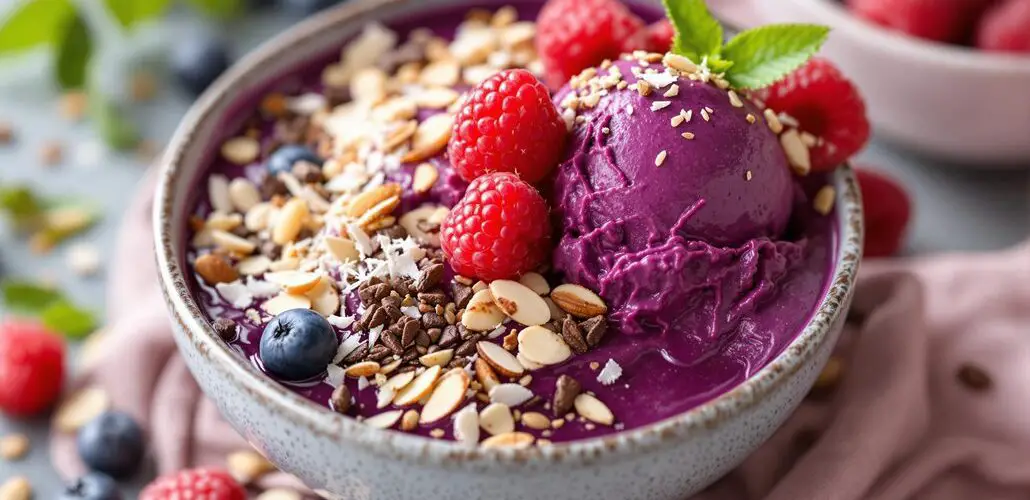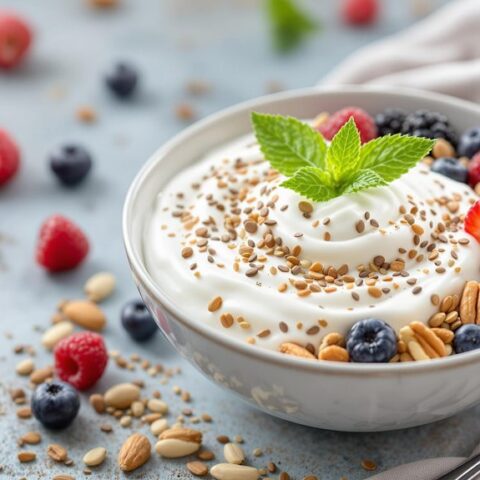
Acai, in its pure and unsweetened form, is keto-friendly owing to its low net carbohydrate content of only 1g per 100g. This berry supports ketosis by facilitating low carbohydrate intake and maintaining stable blood glucose levels. It is essential to choose products without added sugars, as many commercial acai products can contain up to 20g net carbs due to sweeteners, potentially disrupting ketosis. Acai also provides beneficial fats, fiber, and antioxidants, aiding in weight management and supporting overall health. For those exploring keto meal options, further insights are available on optimizing acai consumption within the diet.
Key Takeaways
- Acai has a low net carb count of only 1g per 100g, making it suitable for a keto diet.
- Unsweetened acai products maintain stable blood glucose levels, aiding ketosis.
- Choose unsweetened acai puree or powder to avoid added sugars that disrupt ketosis.
- Scrutinize labels to ensure acai products align with keto dietary goals.
- High fiber content in acai supports digestion and promotes satiety on a keto diet.
Acai and Keto Diet
In the context of the ketogenic diet, açaí emerges as a potentially compatible fruit option due to its low carbohydrate content. Specifically, 100 grams of unsweetened açaí contain merely 4 grams of carbohydrates, with a net carb count of just 1 gram when accounting for fiber. This low-carb profile makes açaí an appealing choice for individuals adhering to a keto diet, which prioritizes reduced carbohydrate intake to facilitate a metabolic state known as ketosis.
Additionally, the ketogenic diet greatly reduces blood glucose levels and enhances insulin sensitivity, which is vital for type 2 diabetes management. For those following a ketogenic diet, it is essential to select unsweetened açaí products, such as those certified keto by brands like SAMBAZON. These products are formulated to maintain stable blood glucose levels, thereby supporting ketosis.
Conversely, commercially available açaí products often contain added sugars, which greatly increase carbohydrate content and can potentially disrupt ketosis. When preparing açaí bowls, it is advisable to monitor portion sizes and choose low-carb toppings to optimize the balance between enjoying this nutrient-rich fruit and maintaining ketosis.
Nutritional Profile
With a detailed examination of its nutritional profile, açaí emerges as a nutrient-dense fruit that aligns well with the principles of a ketogenic diet. Remarkably, 100 grams of unsweetened açaí contain only 4 grams of carbohydrates, of which 3 grams are dietary fiber. This results in a minimal net carb content of merely 1 gram, making it an ideal choice for those looking to maintain low carbohydrate intake.
The low sugar content additionally supports its compatibility with the keto diet, as açaí does not greatly impact blood glucose levels.
In addition to its favorable carbohydrate profile, unsweetened açaí provides 5 grams of fat and 1 gram of protein per 100 grams, contributing to the macronutrient distribution sought in a ketogenic diet. The high fiber content aids in digestion and provides a sense of fullness, which can be beneficial for those adhering to such dietary restrictions.
Moreover, the berry and chocolate-like flavor profile of açaí enhances its versatility, allowing it to be incorporated into various keto-friendly recipes, including açaí bowls. This makes açaí not only a nutritionally sound choice but also a palatable one in the context of a ketogenic lifestyle.
Choosing Products
When selecting acai products for a ketogenic diet, it is imperative to opt for unsweetened acai puree or powder to reduce the intake of added sugars and carbohydrates.
Thoroughly examining product labels for hidden sweeteners such as honey or maple syrup is essential, as these can considerably increase carbohydrate content and hinder ketosis.
Additionally, incorporating low-carb toppings and choosing products from reputable brands with high fiber content can further enhance the suitability of acai within a keto meal plan.
Unsweetened Acai Options
Selecting the right acai products for a ketogenic diet necessitates careful attention to product labels to confirm they are unsweetened and free from added sugars. Unsweetened acai is essential for minimizing carbohydrates, thereby confirming alignment with keto dietary goals.
For those strictly adhering to a keto diet, frozen acai pouches, such as those certified by SAMBAZON, provide a keto-friendly option. These products typically contain minimal carbohydrates, with a typical 100-gram serving of unsweetened acai having only 4 grams of carbohydrates and a net carb count of just 1 gram after accounting for fiber. This showcases their suitability for maintaining ketosis.
When selecting acai products, consider the following guidelines:
- Choose Unsweetened Options: Opt for unsweetened acai puree or powder to avoid the addition of carbohydrate-increasing sweeteners, such as honey or cane syrup.
- Verify Product Labels: Scrutinize labels for any added sugars that may undermine keto dietary goals.
- Evaluate Carbohydrate Content: Prioritize products listing low total carbohydrates and net carbs.
- Select Trusted Brands: Choose brands known for offering pure, unsweetened acai, like SAMBAZON, to confirm the product is genuinely keto-friendly.
These steps will facilitate the selection of suitable acai products for keto adherence.
Label Sugar Content
Understanding the sugar content on product labels is fundamental for anyone committed to a ketogenic diet. Acai products often vary in their carbohydrate content due to the presence of added sugars such as honey, agave, or cane syrup, which can substantially increase their net carb count and compromise keto compatibility. To maintain a keto-friendly regimen, it is crucial to select pure unsweetened acai options, as they typically contain minimal carbohydrate content. For instance, SAMBAZON's unsweetened acai offers a net carb count as low as 1g per 100 grams.
To aid in discerning these differences, consider the following table:
| Product Type | Net Carb Count (per 100g) | Added Sugars |
|---|---|---|
| Pure Unsweetened Acai | 1g | None |
| Sweetened Acai Blend | 20g | Honey, Cane Syrup |
| Certified Keto Acai* | Varies | None |
*Products tested for acceptable blood glucose levels.
It is essential to examine the total carbohydrate content, as some acai products may include high-carb ingredients that obscure their keto-friendliness. Opting for certified keto acai guarantees that these products have been rigorously tested, providing a reliable measure to safeguard against unexpected blood glucose level spikes. The discipline of scrutinizing labels is a critical step in maintaining ketosis while enjoying acai.
Low-Carb Topping Choices
In crafting a keto-friendly acai bowl, selecting low-carb toppings is imperative to maintain the diet's integrity. Opting for toppings that are low in carbohydrates guarantees that the acai bowl remains aligned with ketogenic principles, which prioritize healthy fats and minimal carbohydrates.
Incorporating low-carb toppings such as unsweetened shredded coconut and chia seeds can enhance the nutritional profile of the acai bowl without compromising ketosis. Additionally, these ingredients offer a source of healthy fats essential for sustaining energy levels on a keto diet.
To assist in making informed choices, consider the following low-carb topping options:
- Unsweetened Shredded Coconut: A keto-friendly addition that provides texture and flavor without added sugars or excess carbs.
- Chia Seeds: Rich in omega-3 fatty acids and fiber, chia seeds contribute to the acai bowl's nutritional value while keeping carbohydrate content low.
- Nuts: Almonds, walnuts, or pecans introduce healthy fats and a satisfying crunch, enhancing the bowl's overall appeal.
- Fresh Low-Carb Berries: Berries like raspberries and blackberries offer antioxidants and vitamin C without the high-sugar content of other fruits.
Avoid high-sugar toppings such as granola or syrup and always examine packaged toppings for hidden added sugars to maintain a keto-friendly acai bowl.
Keto Acai Recipes
Crafting keto acai recipes requires a strategic selection of ingredients to guarantee they remain low in carbohydrates while providing a nutrient-dense profile. The foundation of these recipes should be unsweetened acai puree or powder, which avoids unnecessary added sugars.
Utilizing coconut milk and avocado can enhance the creamy texture, while contributing healthy fats that are essential for maintaining ketosis. When choosing sweeteners, consider options like monk fruit or stevia to add sweetness without disrupting ketosis. Incorporating low-carb berries, such as raspberries or blackberries, can enhance flavor without greatly increasing net carbs, which can be as low as 3 grams per serving in a well-formulated dish.
To bolster the nutritional profile and address the inherently low protein content of acai, one can integrate protein powder or Greek yogurt. These additions not only support muscle maintenance but also contribute to satiety.
Customizable toppings such as nuts, seeds, and unsweetened coconut flakes can be used to introduce additional healthy fats and texture, further enhancing the keto-friendly nature of the dish. By carefully selecting these components, keto acai recipes can serve as a versatile and satisfying option for those adhering to a low-carb dietary regimen, while ensuring a balanced nutrient intake.
Health Benefits
Due to its rich antioxidant profile, acai has garnered attention for its potential health benefits, particularly in the context of a keto diet. The acai berries are abundant in anthocyanins, a class of antioxidants that protect against oxidative stress, thereby potentially lowering the risk of chronic diseases. This makes acai a compelling addition to a ketogenic diet, known for prioritizing nutrient-dense foods.
The keto diet is also recognized for its cardiovascular health benefits, such as increasing HDL cholesterol and reducing triglycerides, both of which can be complemented by acai's effects on cholesterol.
The following are key health benefits associated with acai berries:
- Digestive Health: The high fiber content in acai aids in digestive health, promoting regularity and satiety. This fiber content is valuable for those on a ketogenic diet, as it may help reduce cravings and improve adherence to dietary goals without compromising ketosis.
- Cardiovascular Support: Acai's antioxidants have been shown to improve cholesterol levels, contributing to enhanced heart health. This is particularly relevant for individuals following a ketogenic diet who may be concerned about cholesterol management.
- Anti-Inflammatory Properties: Acai berries possess anti-inflammatory properties that can address inflammation-related health concerns. This contributes to overall well-being and may reduce health risks associated with chronic inflammation.
- Nutrient Density: Acai provides healthy fats, making it a nutrient-dense option suitable for a ketogenic diet, supporting both energy levels and heart health.
Weight Management
Incorporating acai into a ketogenic diet may offer significant weight management benefits due to its low-calorie profile and high fiber content.
The fiber in acai can enhance satiety, potentially reducing the frequency of snack cravings and aiding in maintaining a calorie deficit necessary for weight loss.
Additionally, the strategic inclusion of low-carbohydrate acai preparations, such as smoothie bowls, can align with dietary goals while supporting sustained fullness between meals.
Fiber Boosts Fullness
With 3 grams of dietary fiber per 100 grams, açaí serves as an effective component in promoting satiety, which is essential for weight management on a ketogenic diet.
The fiber content in açaí contributes to a net carb count of only 1 gram, positioning it as a low-carb option that aligns with keto diet principles.
By enhancing feelings of fullness, açaí helps to curb cravings, thereby reducing overall caloric intake—an important factor for weight management.
Furthermore, fiber is known to support digestive health by facilitating regular bowel movements and maintaining ideal gut function.
Benefits of Açaí's Fiber Content:
- Satiety and Cravings: The high fiber content in açaí promotes satiety, making it easier to manage cravings and adhere to a low-carb, nutrient-dense diet plan.
- Net Carbs: With only 1 gram of net carbs, açaí fits seamlessly into a keto diet, offering a satisfying, low-carb option without compromising carbohydrate limits.
- Digestive Health: Dietary fiber in açaí aids in digestive health, supporting regular bowel movements and overall gut wellness.
- Nutrient-Dense: Açaí's combination of fiber and healthy fats contributes to a nutrient-dense profile, providing essential vitamins and sustaining energy levels.
Low Calorie Option
How can acai serve as a low-calorie option for weight management? Acai berries are inherently low in calories, with a standard serving consisting of approximately 211 calories. This characteristic makes acai an excellent choice for those pursuing weight management objectives. The berries' high fiber content, approximately 3 grams per 100 grams, further enhances their appeal by promoting satiety. This can be particularly beneficial in a keto diet where maintaining low-calorie intake is essential. Unsweetened acai products are also low in sugar and carbohydrates, aligning well with low-calorie dietary plans by not causing significant blood sugar spikes.
One can effectively incorporate acai into various meals, such as smoothies and bowls, providing a flavorful yet low-calorie alternative to more calorie-dense snacks. This nutrient-dense fruit is rich in essential vitamins and antioxidants, making it a healthful meal addition without excessive calorie consumption.
| Feature | Acai Benefits |
|---|---|
| Calories | Low calorie (211 per serving) |
| Sugar Content | Low in sugar (unsweetened) |
| Fiber | High fiber content |
| Nutrient Density | High in vitamins and antioxidants |
| Versatility | Ideal for smoothies and bowls |
Incorporating acai into dietary routines can support weight management efforts effectively.
Curbing Meal Cravings
Acai's low-calorie profile is not only beneficial for weight management but also plays a significant role in curbing meal cravings. Its high fiber content, with 3 grams per 100 grams, is instrumental in promoting satiety, a critical factor in reducing the frequency of meal cravings.
When incorporated into a keto diet, acai's high fiber content can help maintain a feeling of fullness, thereby supporting effective weight management strategies. Additionally, its antioxidant-rich composition aids in mitigating oxidative stress, which is often associated with weight gain.
To effectively curb meal cravings, consider the following acai-based strategies:
- Smoothies: Incorporate acai into low-sugar smoothies to harness its satiety benefits while avoiding spikes in blood sugar levels. This can be a satisfying snack option that aligns with keto diet principles.
- Bowls: Create acai bowls that are both nutritious and low in sugar. These bowls can serve as a substantial meal replacement, further aiding in controlling cravings.
- Fiber Boost: The high fiber content in acai can enhance digestion and prolong feelings of fullness, minimizing the inclination for unhealthy snacking between meals.
- Antioxidant Support: Regular consumption of acai can contribute to weight management by reducing oxidative stress, thereby indirectly supporting a balanced dietary approach.
Product Sources
When considering sources for keto-friendly açaí products, it is vital to focus on options that are unsweetened and derived from reputable brands. Açaí products, such as those offered by SAMBAZON, are recognized for their high quality and keto-friendly certification, which guarantees minimal impact on blood glucose levels.
Selecting pure açaí puree or powder without added sugars is important to maintaining keto compatibility, as numerous popular açaí products contain sweeteners that can increase carbohydrate content, and consequently affecting daily carb limits. Additionally, unsweetened beverages such as water and black coffee are other keto-friendly options that align well with açaí-based diets.
Health food stores and online retailers provide a variety of keto-friendly açaí options, including frozen açaí packs and powdered forms. These products are typically low in sugar and carbohydrates, making them suitable for individuals adhering to a ketogenic diet. It is essential to scrutinize nutrition labels for carbohydrate content and potential added sugars to verify these products align with one's dietary requirements.
Furthermore, reputable brands emphasize sustainability and quality sourcing, enhancing both the nutritional benefits and environmental responsibility of their açaí offerings.
Frequently Asked Questions
How Many Carbs Are in Acai?
Acai berries contain approximately 4 grams of carbohydrates per 100 grams. Evaluating acai nutritional benefits, this fruit offers antioxidant properties comparable to blueberries, with potential health risks minimized when adhering to dietary guidelines. Incorporating acai in smoothies enhances its consumption.
Is Acai Too High in Sugar?
Acai sugar content varies considerably based on products. Pure acai's nutritional profile, rich in fiber and antioxidants, offers health benefits, but commercial options may contain high sugars. Evaluating acai serving size and recipe ideas guarantees diet compatibility.
Are Acai Bowls Low in Carbs?
Acai bowls can be low in carbs if prepared with unsweetened acai and mindful ingredient swaps. Selecting low-carb toppings, adjusting acai portion sizes, and exploring acai bowl variations enhance nutritional profiles, differentiating them from traditional acai smoothie recipes.
Is Acai OK for Weight Loss?
Acai berries, with their nutrient-dense profile, are beneficial for weight loss. Acai nutrition supports fullness and energy, while antioxidants aid detox and health. Incorporating acai in smoothies, meals, or supplements enhances dietary plans with versatile recipes.
Conclusion
Acai can be compatible with a ketogenic diet when consumed judiciously, given its moderate carbohydrate content. The nutritional profile of acai, rich in antioxidants and healthy fats, complements the high-fat, low-carbohydrate requirements of the keto regimen. Selecting unsweetened, pure acai products guarantees minimal carbohydrate intake. Incorporating acai into keto recipes can enhance dietary variety while supporting health benefits such as improved antioxidant status and potential weight management. Acai's inclusion in a keto diet necessitates careful portion control to maintain ketosis.










No Comments